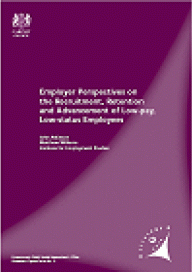Publications
 We author and publish a range of resources to keep you up to date with the latest developments in employment, labour market and human resource policy and practice.
We author and publish a range of resources to keep you up to date with the latest developments in employment, labour market and human resource policy and practice.
All our pdf publications are free to access.
Search results
-

Employer Perspectives on the Recruitment, Retention and Advancement of Low-pay, Low-status Employees
Atkinson J, Williams M | Jun 2003 | Cabinet OfficeLow skill, low status jobs in the UK can constitute a first step on a ladder to rising lifetime earnings, in which experience, tacit skills, contacts and know-how can be acquired and used to promote a pay off later. However, in practice, they provide little or no basis for substantial advancement through the labour market: the evidence suggests that short-term mobility in the wage distribution is limited, and that individuals who do progress, do not generally progress very far.
-
📄
A Review of Current Research into Absence Management
Hill D, Hayday S | Apr 2003 | Institute for Employment StudiesThis paper reviews the most recent findings in absence statistics and attendance management. This will serve as a resource for researchers and HR managers attempting to understand what can be done to improve attendance management, and also to compare and contrast the various absence statistics among different business types, and job functions.
-
📄
Defining and Creating Employee Commitment
a Review of Current Research
Robinson D | Mar 2003 | Institute for Employment StudiesOver the past ten years, the study of commitment has advanced in many different directions. A variety of disciplines have adopted the topic as a theme in their research and these have offered fresh and significant insights. These recent advances include new approaches to both the conceptualisation of employee commitment and the particular human resource practices intended to increase it. This review discusses the definition of commitment and its creation based on IES' extensive experience of working in this area and a comprehensive literature review.
-
📄
Questions to Measure Commitment and Job Satisfaction
Hayday S | Feb 2003 | Institute for Employment StudiesAs the title suggests, this paper identifies questions measuring employee commitment and job satisfaction. There are limitations to measuring morale and motivation by direct questions about their levels. The more practical approach of using statements about commitment and job satisfaction as indicators was discussed as these provide greater understanding of the issues.
-
📄
Organisational Citizenship Behaviour
Possible Attitude Statements
Feb 2003 | Institute for Employment StudiesThis paper suggests attitude statements that test organisational citizenship behaviour.
-

Review of Existing Supporting Scientific Knowledge to Underpin Standards of Good Practice for Key Work-Related Stressors, Phase 1
Rick J, Thomson L, Briner R, O'Regan S, Daniels K | Sep 2002 | Health and Safety ExecutiveThis study was undertaken to identify the best available evidence on the ways in which nine stressors affect individuals at work.
-

Work-Life Balance: Beyond the Rhetoric
Kodz J, Harper H, Dench S | Feb 2002 | Institute for Employment StudiesMany employers now recognise that work-life balance is a key issue and offer employees a range of flexible working options. Nevertheless, take-up of these options remains low. The perceived impact on career prospects, as well as a number of other factors, can be off-putting for employees. Individuals and their managers therefore need to be supported to get over some of the difficulties and barriers they experience to ensure work-life balance policies and practices work effectively.
-
📄
How Can We Manage Work-Related Stress?
Thomson L | Feb 2002 | Institute for Employment StudiesOver the past decade, organisations have become increasingly aware of the need to manage stress. There have been two drivers for this. The first is the need for a motivated and productive workforce, where the negative effects of stress on attendance, performance, job satisfaction and commitment are minimised. The second is an organisation's legal responsibilities for the care of their employees.
-

Costing Sickness Absence in the UK
Bevan S, Hayday S | Sep 2001 | Institute for Employment StudiesDespite growing concern over sickness absence, organisations appear fundamentally ill equipped to form a comprehensive view of their absence costs. The most usual method of estimation uses only the basic salary of the absent employee, and neglects other significant aspects such as salary oncosts, overtime, payments to replacement workers, and all management costs from both line management or HR functions. This applies even to 'leading edge' UK employers who have the most sophisticated information systems.
-
📄
Managing Staff Retention
Bevan S | Jul 2001 | Institute for Employment StudiesIt wasn't so long ago that UK employers were worried about labour surpluses. Inevitably, as recession turns into boom, concern about growing levels of employee turnover and skill shortages bubble up once more. So are employers right to press the panic button again? Should they brace themselves once more for long-forgotten turbulence in the labour market?
